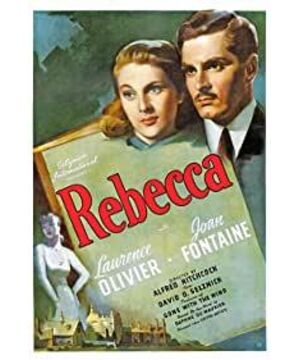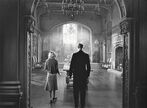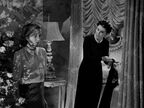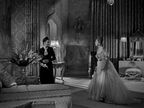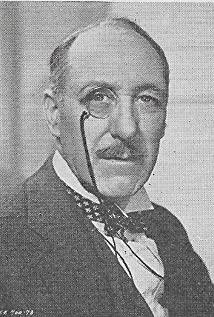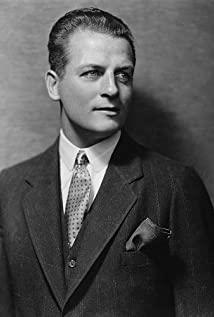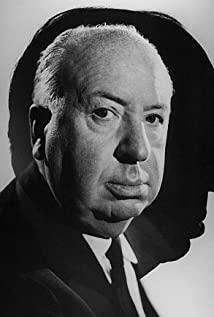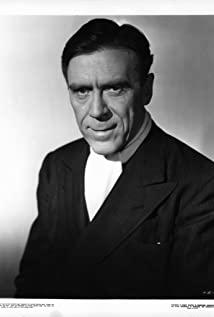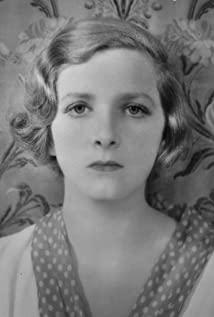"Butterfly Dream" is the first film directed by the British director Alfred Hitchcock in 1940 after the British director Alfred Hitchcock went to the United States. It is adapted from the novel "Rebecca" of the same name by the British female writer Daphne Du Maurier. This suspenseful psychological film that melts love, horror, plot, suspense, and psychology into many types of film elements. It won the 13th Oscar for Best Picture, Best Photography (Black and White) Award, and won the Best Director in one fell swoop Wait for 10 nominations.
At the beginning of the film, in the protagonist "I"'s narration and the sound of nostalgia and mysterious music, the moving images that accompany the entrance through the door, along the hazy moon, mist, and weedy winding paths and Driveway, step by step approaching the ruins of Mandeli City Building. Especially presented with a backlit silhouette of a horizontally shifted lens, it shows its majesty, silence and heaviness. The opening chapter of Nanke Yimeng has a flashback image structure and narrative structure for the whole film. That is, the suspense frame structure that draws people from the effect to the cause to solve the mystery of the ruins.
After the dream of "I" returned to the past, Mrs. Van Hopper, her character setting, her presence, her speech and image modeling all played the role of kinking, setting up and setting off. First of all, she is the necessary medium to connect "me" as an escort with the rich man Derwent. Due to her special skills in threading and threading, Fangyou escort girl met Derwent again, fell in love at first sight, and developed into a "Cinderella and Prince" marriage during her illness. At the same time, with Mrs. Van Hopper's jeweled identity, flattering air, admiring tone and the style of the Casino Hotel where she is located, it demonstrates the status of Derwent and the "greatness" of Mandeley City. Especially with her language as a link, the city of Mandeley and the former wife of Derwent, Rebecca, are tied together, thus entangled Mandeley’s "Ruined Mystery" and Rebecca’s "Drowning Mystery" into a bigger one. Mystery and suspense. She introduced the drowning death of the former wife of Derwent to the escort girl twice, reflecting that Derwent first stood on the cliff, and then claimed that she had no interest in gambling and did not want to return to Mandley. She especially heard the mention. And when "there was another person drowned last year", he became uneasy. These suspicious series of small suspense entices the heroine and even the audience to follow Derwent's painful and uneasy attempts to "solve the doubt" and "explain the suspense" for the drowning of his wife.
The artistic skills of film editing, directing and acting are also manifested in inadvertently revealing the psychological state of the characters. Even with Mrs. Van Hopper's important character this time, she can see through a few words the dark side of her heart. This evil of human nature is exactly what she has in common with Mrs. Danvers, so she has become a complementary image with Danvers. As for Danvers, he and his former wife, Rebecca, are both real and imaginary. The newlyweds drove into the city of Mandeley, and 20 servants lined up to welcome Danvers. Danvers suddenly entered the painting, and he was the head of the flock. Her face was always green and her eyes were compelling, causing the new lady to be scared and at a loss when they first met. She had been here since her former wife was newly married. After her death, the former wife took over the house and took over the house, arrogant and domineering, openly arrogant, denounced the new hostess, and even questioned the whereabouts of a porcelain accessory. Derwent’s brother-in-law commented that she was “horrible like an ancient carved image”, and her sister concluded that she would be jealous of the new lady and would not be friendly to each other. The reason was that she regarded Rebecca as an idol. The essence is that Danvers uses his worship of Rebecca as a stepping stone to become the actual controller under one person and above everyone in Mandeley City. She is the "presence" stand-in of Rebecca who is "absent", and the real "idol" who is "born" from the ghost of Rebecca, and she is more hideous than Rebecca's beautiful sin. It's jealousy, hatred, greed, old hot, and insidious.
In the film, Danvers' "into the painting" and "presence" often come unexpectedly, appearing out of nowhere, just like ghosts. In Mandeley, Danvers' strange gaze seemed to be lurking everywhere, and Danvers' value judgment and thinking were permeated, causing the new lady to be frightened. If this area is centered on the city of Mandley, then the "center" of the center is the dark ghost Danvers with a green face. Under the rule of the butler Danvers, Rebecca's ghost lingered. For the new lady, the "Great Mandley City" that Mrs. Van Hopper admired has become a spiritual prison of imprisonment.
The image of Mandeley City in the film has a fairy-tale castle-like exterior appearance, which has the "meaning" of "outside the elephant" that is given to the magic city and the stone prison. At the same time, in the film’s narrative images and “sound-image” performances, the new lady held her shoulders and shook her wrists from time to time, the sparkling of the fireplace flame, reflecting the openness and coldness; the curtains of the West Hall fluttered from time to time, the puppy’s uneasy barking, and the seaside The weird picking of Behan by the door of the hut highlights its eerie and horror. The West Building where Rebecca lives, her favorite costumes and their relics, to the beach house, always aroused the different throbs of Derwent and the new wife. These not only became suspense nodes in the film, but also thickened the fog of Rebecca's drowning death. That is to say, the stress of Mandeley City as a mental cage was strengthened, causing the new lady to almost have a mental breakdown, and her love with Derwent was almost crushed and destroyed.
Danvers has always coveted Jack Favel, Rebecca's adulterer, secretly colluding with the coveted Mandley, and pressured again and again, pressing on every step of the way, until he tried to persuade him and seduce the new lady who lost self-confidence and was in agony. Jumped into the sea to commit suicide. Danvers is not only a component of Rebecca's human evil, but also a continuation and extension of Rebecca's human evil after her suicide. Until the truth of Rebecca's death became clear, Fawell's plan to swindle money failed, and Danvers, who did not want to see his new wife happy, actually burned the city of Mandeley and was buried in the fire.
The English title of the film is "Rebecca", but Rebecca herself never appeared in the film, becoming an absent "absence", which constitutes a big suspense. However, Rebecca is ubiquitous in Mandeley City, becoming an absent "presence", which constitutes another major technique and feature of the film's artistic expression. The "R" image in the film, as a symbol of Rebecca's name, is a materialized symbol of the late Rebecca and his ghost. It is also a sharp blade for Danvers to carry out mental harm to the new wife and continue to do evil. The word "R" has become a lingering element of thriller in the film. Danvers is the creator of Rebecca's ghost. She flooded the ghost of Rebecca inside and outside the Mandeley Building, and transformed Mandeley City into a cage that imprisoned and destroyed the spirit and will of the new lady, thereby destroying the love between Derwent and the new lady, and fundamentally destroying their happiness. cornerstone. She exhausted all the agencies and took advantage of the new lady's desire to hold a grand fancy dress party to repair the emotional crisis, and cleverly arranged traps to induce the new lady to wear the same clothes as the former lady, causing Derwent to furious. In Rebecca's bedroom, Danvers revealed his murderous intentions, pointed at the sea outside the window, and forced the new lady to commit suicide: "You don't need to stay here, you don't need to be alive anymore."
At the end of the film, the "R" was burned in the raging fire in Mandeley City, responding to the suspense set at the beginning of the film, stitching the whole film together, and also meant a spiritual prison and the destruction of human evil.
In terms of character creation, the new lady contrasts with Rebecca's beauty and evil and Danvers's evil of human nature. Although she was born poor and weak, she fully demonstrates the beauty of human nature. Not only is she pure and gentle, gentle and modest, and the water is quiet and deep, she also respects the principle of the supremacy of love and single-mindedly. Sketching by the sea, she saw Devonte standing on the cliff, fearing he would commit suicide, and hurriedly stopped; facing the rich, she had no flattery, but she was a little embarrassed to stare at Devon for the moment. From meeting, falling in love to getting married, although the time is short, but she wants to make each other happy. Unlike Rebecca, who never thinks about others, the new lady is willing to help the servants when she comes to the city of Mandeley.
She is not only demanding of herself, seriously reviewing herself, but also striving to create a more perfect self. She pursues the sincerity of love. When she felt it was difficult to integrate into Mandley City, she said to her husband: "If you feel unhappy, you don't have to pretend, please tell me honestly, I can go." Encouraged by Derwent, especially when she discovered Denver The hidden affair between S and Favre, the correspondence between Favre and Rebecca, and Danvers's intensified threats and injuries, she finally rose up to resist and asked Danvers to take these things away. Danvers refused, claiming that it was a lady's thing, and she replied "Now I am the lady". When the yacht was salvaged, Derwent told the truth that Rebecca was blamed on him to death, and felt desperate because the shipwreck might face accusations and rulings of murder. She insisted that she would only love him forever. No matter where he is taken, he must be with him. At the end of the film, she hugged Derwent, looked at the fire in Mandley, and told her husband that Mrs. Danvers said she did not want to see her happiness, and she finally won happiness.
Image modeling elements such as shapes, lines, spatial layout, perspective relations, dynamic changes, light effects, shades, and tones, which are manifested by the material elements of people, scenery, objects, light, and color, are subject to the subjectivization of the film creators. It becomes an artistic "detailed image" that is based on the image, serving the film's image shaping, psychological portrayal, atmosphere, plot development, and theme expression. For example, the use of color: Mrs. Danvers, the butler, always wore a black dress. This black color is reminiscent of the dark night and the deep hole, giving people a sense of pressure. In addition, she is deliberately unpredictable, with a sullen face and a ghostly appearance, like a witch and a black ghost, which not only makes Mrs. Derwent feel depressed and afraid, but also makes the audience feel a kind of horror unexpectedly. In order to enhance the horror effect of the film, the puppy Gabas in the film is also a black poodle, which often appears in mysterious scenes.
As a black and white film, the main creator creatively used the artistic expression of light and shadow and its aesthetic creation function. The film three times shows the overall view of the city of Mandeley, the castle ruins recalled at the beginning, and then the newlyweds' car slowly passed in front of the castle. At the end of the film, Derwent and Frank drove past the fire-burning castle. The backlit silhouettes of the horizontally shifted lens are used to make the three visual images of Mandley City before, during and after the fire extremely eye-catching. Especially the latter two shots form a comparison of the height and the low, the big and the small, the front and the side of the castle and the car, which not only brings out the majestic and majestic city of Mandeley, but also it is a coincidence that although shooting with a model can avoid clumsiness Power.
After the newlyweds’ car entered Mandley City, Derwent encouraged his wife not to be afraid or worry about housework, and told the housekeeper that Mrs. Danvers was in charge of all the housekeeping. The corresponding shots showed the shadow of the tree in Mrs. The body and face flashed quickly, and the lady's uneasy state of mind at this time was externalized. When the new lady first arrived in Mandeley, when the new lady went downstairs through the corridor, Danvers and the shadow on the corridor wall followed behind her, making the painting present a pressure, mystery, and horror atmosphere. Afterwards, Danvers pointed to the two carved doors of the West Hall and told the new lady that it was the former lady's residence when she was alive. On the close-up screen, there was a shadow of rain flowing on the new lady's back. Then, the lady saw a black dog lying in front of the door, and at this moment, a pointed arch was projected on her back, that is, the shadow of a Gothic architectural style window.
This Gothic spire arch symbolizes the flames of hell, which is also a metaphor for the essence of Mandeley City, which is filled with Rebecca's ghost under Danvers's management, and becomes an allegorical image. These "weird" images with suspense and horror elements strengthen the film's unique style from different angles and levels. The music "sound image" of the film is also mostly used for freehand, expressing, setting off or mysterious, or tense, or rush, or nostalgic atmosphere and rhythm.
Due to the limitations of film technology at the time, some exterior shots made with background synthesis are inevitably distorted. However, the slight flaws in the white wall do not detract from the "Butterfly Dream" filmed by Hitchcock as the master of suspense movies in the early 1940s. With its modern colors, mixed types, excellent techniques, and unique styles, it has shined in the world film history. The brilliance is undiminished.
View more about Rebecca reviews


